审稿意见表 (1)[1]
- 格式:doc
- 大小:41.50 KB
- 文档页数:2
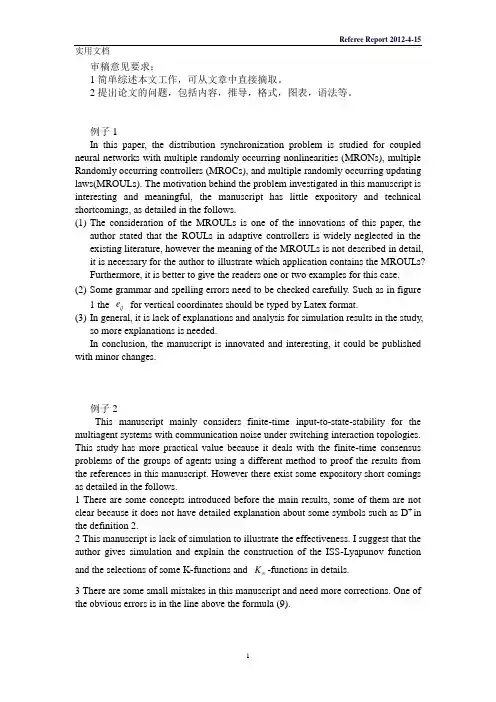
审稿意见要求:1简单综述本文工作,可从文章中直接摘取。
2提出论文的问题,包括内容,推导,格式,图表,语法等。
例子1In this paper, the distribution synchronization problem is studied for coupled neural networks with multiple randomly occurring nonlinearities (MRONs), multiple Randomly occurring controllers (MROCs), and multiple randomly occurring updating laws(MROULs). The motivation behind the problem investigated in this manuscript is interesting and meaningful, the manuscript has little expository and technical shortcomings, as detailed in the follows.(1)The consideration of the MROULs is one of the innovations of this paper, theauthor stated that the ROULs in adaptive controllers is widely neglected in the existing literature, however the meaning of the MROULs is not described in detail, it is necessary for the author to illustrate which application contains the MROULs?Furthermore, it is better to give the readers one or two examples for this case.(2)Some grammar and spelling errors need to be checked carefully. Such as in figuree for vertical coordinates should be typed by Latex format.1 theij(3)In general, it is lack of explanations and analysis for simulation results in the study,so more explanations is needed.In conclusion, the manuscript is innovated and interesting, it could be published with minor changes.例子2This manuscript mainly considers finite-time input-to-state-stability for the multiagent systems with communication noise under switching interaction topologies. This study has more practical value because it deals with the finite-time consensus problems of the groups of agents using a different method to proof the results from the references in this manuscript. However there exist some expository short comings as detailed in the follows.1 There are some concepts introduced before the main results, some of them are not clear because it does not have detailed explanation about some symbols such as D+ in the definition 2.2 This manuscript is lack of simulation to illustrate the effectiveness. I suggest that the author gives simulation and explain the construction of the ISS-Lyapunov function and the selections of some K-functions and K-functions in details.3 There are some small mistakes in this manuscript and need more corrections. One of the obvious errors is in the line above the formula (9).例子3This paper investigates the problem of dynamic feedback control over unreliable communication channels with nonstationary packet loss. The zero input scheme and the hold input scheme are used to solve this problem respectively. However, I don’t think the manuscript is constructive for the zero input scheme and the hold input scheme are investigated in many reference. Finally, there are not enough innovatory ideas in this manuscript. The detailed comments are as follows.1 the quality of figure1 is too poor to read.2 the definition of equation 7 is confused, why the author give this definition.3 equation 15 is wrong, in fact it is an inequality.4 we don’t think the variable below equation 17 can be gotten by equation 75 we want to know what the relation between the zero input scheme and the hold input is. The relation and the compare should be proposed in detail between the two schemes in this manuscript if it can be accepted.。
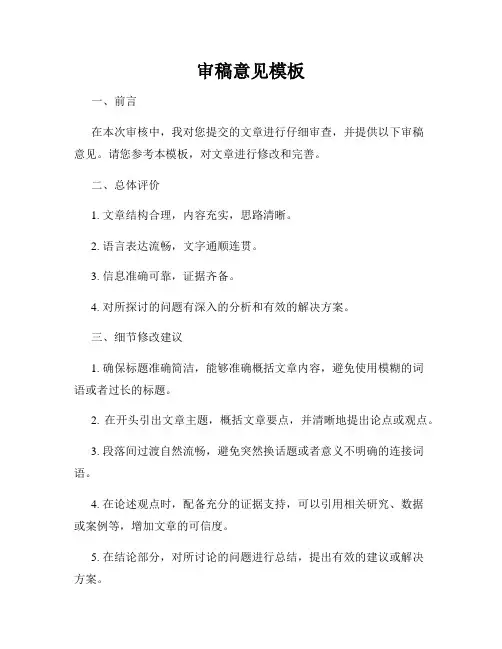
审稿意见模板一、前言在本次审核中,我对您提交的文章进行仔细审查,并提供以下审稿意见。
请您参考本模板,对文章进行修改和完善。
二、总体评价1. 文章结构合理,内容充实,思路清晰。
2. 语言表达流畅,文字通顺连贯。
3. 信息准确可靠,证据齐备。
4. 对所探讨的问题有深入的分析和有效的解决方案。
三、细节修改建议1. 确保标题准确简洁,能够准确概括文章内容,避免使用模糊的词语或者过长的标题。
2. 在开头引出文章主题,概括文章要点,并清晰地提出论点或观点。
3. 段落间过渡自然流畅,避免突然换话题或者意义不明确的连接词语。
4. 在论述观点时,配备充分的证据支持,可以引用相关研究、数据或案例等,增加文章的可信度。
5. 在结论部分,对所讨论的问题进行总结,提出有效的建议或解决方案。
6. 对文章中存在的拼写、语法、标点等错误进行仔细校对,确保文章的语言表达没有问题。
7. 注意文章的层次感,可以使用适当的标题或小节,使结构更加清晰可读。
四、总结根据以上审稿意见,希望您在修改文章时能够参考这些建议,并对文章进行进一步的完善。
感谢您的投稿,期待您的再次提交!参考修改方案:(以下为修改后的示例,请根据具体情况进行修改)---一、前言本次审稿中,我对您提交的文章进行了仔细审查,并提供以下审稿意见。
您可以参考本模板,对文章进行修改和完善。
二、总体评价1. 文章结构合理,内容充实,思路清晰。
2. 语言表达流畅,文字通顺连贯。
3. 信息准确可靠,证据齐备。
4. 对所探讨的问题有深入的分析和有效的解决方案。
三、细节修改建议1. 标题应准确概括文章内容,避免使用模糊的词语或过长的标题。
2. 开头应引出文章主题,概括文章要点,并清晰地提出论点或观点。
3. 段落间过渡自然流畅,请避免突然换话题或使用意义不明确的连接词语。
4. 论述观点时,请配备充分的证据支持,可以引用相关研究、数据或案例等,增加文章的可信度。
5. 结论部分要对所讨论的问题进行总结,并提出有效的建议或解决方案。
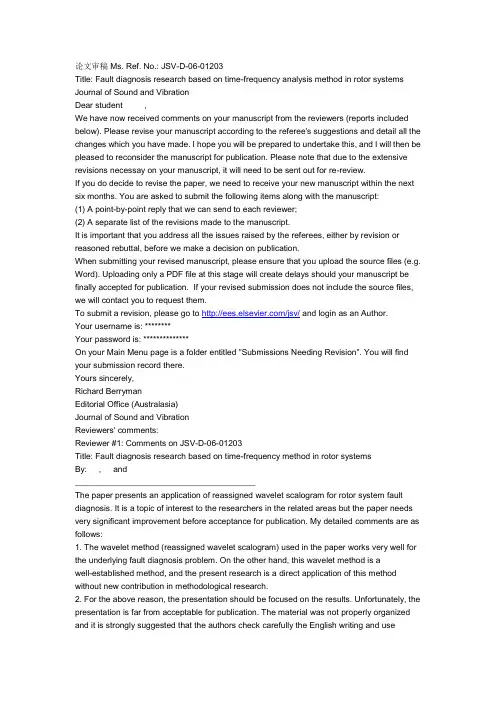
论文审稿Ms. Ref. No.: JSV-D-06-01203Title: Fault diagnosis research based on time-frequency analysis method in rotor systems Journal of Sound and VibrationDear student ××××,We have now received comments on your manuscript from the reviewers (reports included below). Please revise your manuscript according to the referee's suggestions and detail all the changes which you have made. I hope you will be prepared to undertake this, and I will then be pleased to reconsider the manuscript for publication. Please note that due to the extensive revisions necessay on your manuscript, it will need to be sent out for re-review.If you do decide to revise the paper, we need to receive your new manuscript within the next six months. You are asked to submit the following items along with the manuscript:(1) A point-by-point reply that we can send to each reviewer;(2) A separate list of the revisions made to the manuscript.It is important that you address all the issues raised by the referees, either by revision or reasoned rebuttal, before we make a decision on publication.When submitting your revised manuscript, please ensure that you upload the source files (e.g. Word). Uploading only a PDF file at this stage will create delays should your manuscript be finally accepted for publication. If your revised submission does not include the source files, we will contact you to request them.To submit a revision, please go to /jsv/ and login as an Author.Your username is: ********Your password is: **************On your Main Menu page is a folder entitled "Submissions Needing Revision". You will find your submission record there.Yours sincerely,Richard BerrymanEditorial Office (Australasia)Journal of Sound and VibrationReviewers' comments:Reviewer #1: Comments on JSV-D-06-01203Title: Fault diagnosis research based on time-frequency method in rotor systemsBy: ××, ××and ××××××_______________________________________The paper presents an application of reassigned wavelet scalogram for rotor system fault diagnosis. It is a topic of interest to the researchers in the related areas but the paper needs very significant improvement before acceptance for publication. My detailed comments are as follows:1. The wavelet method (reassigned wavelet scalogram) used in the paper works very well for the underlying fault diagnosis problem. On the other hand, this wavelet method is awell-established method, and the present research is a direct application of this method without new contribution in methodological research.2. For the above reason, the presentation should be focused on the results. Unfortunately, the presentation is far from acceptable for publication. The material was not properly organized and it is strongly suggested that the authors check carefully the English writing and usestandard terminologies in the technical area.3. The title of the paper should be more specific since numerous studies have been done on the fault diagnosis of rotor systems using wavelets and time-frequency methods. Also, remove the word "research".4. On Section 1:· This section listed many references that are mainly related to rotor dynamics and are not directly related to rotor system diagnosis. If the authors would like to keep these references, some discussions on the relevance of these refs to the present research are needed.· Review on the directly relevant refs will be more helpful for the reader. Also, time-frequency and wavelets are mainly for non-stationary and transient analysis. The author may discuss in more detail what types of transients and non-stationary components would appear in rotor system vibration.· A few sentences on the organization of the paper will be helpful.5. On Section 2:· Since the major method used in the application is reassigned wavelet scalogram, it is not needed to give the details of three other methods (only give a few words and give the refs). Instead, the authors may discuss more on the relationship between traditional wavelet scalogram and the reassigned wavelet scalogram, and explain why the latter is better than the former.· Eq (2): the right-hand-side is wrong and "2" is missed.· The description after Eq (2) is not clear. See Cohen's book for details about the cross-terms.6. On Sections 3 and 4:The description needs to be improved. The material in Section 3 should be organized in several paragraphs.7. On Section 5:· The authors did a good experiment and some of the phenomena presented in thetime-frequency planes are also very interesting. However, the observations should be described concisely, and the authors should focus more on: 1) whether these phenomena are general characteristics, and 2) if possible, explain the reason of the phenomena and the advantages of reassigned wavelet scalogram over other time-frequency methods.· In fact, it is possible to interpret most of the phenomena in the time-frequency planes using rotor dynamics. For example, shaft rub causes broadband vibration and will result in nearly horizontal lines in the phase planes.· Some of the paragraphs are too long.8. The conclusion should be concise and only summarize the most important contribution of the research.Reviewer #2: This paper presents the results of time-frequency analysis applied to a table top rotating machinery test rig under a set of fault conditions. The title of the paper is very misleading because no automated methods for either fault detection or diagnosis/isolation are discussed in the paper. Rather, under different fault scenarios, several time-frequency methods available in the literature are evaluated for their ability to generate visually discriminating features associated with the fault conditions. Hence, this paper provides acharacterization of time-frequency features associated with rotating machinery faults as opposed to the development of any type of fault diagnosis methodology. Hence, the paper must be judged solely on the quality of the experimentation, the presentation of the results, and how the time-frequency features identified in the various fault cases relates to the dynamical operating conditions of the rig.The main problem with the paper is that it is very poorly written, and this makes the evaluation and interpretation of the main contributions of the paper obscure. The paper requires a complete rewrite to improve the grammar, style and readability. Also consider:In equation (1) on page 2, what does it mean that h(t) is centered at t=0 and f=0? h(t) is a windowing function in the time domain!What is the point of the simulation experiments, what do they add to what is already known about the time-frequency techniques from the literature?Since the only contribution of the paper is the time-frequency analysis, the results of these computations need to be explained in detail in the text and the graphical results need to be properly annotated so that readers can comprehend and understand which distinguishing features are associated with the faults. Currently, the graphical results are poorly displayed and it is difficult to correlate the figures with the text.以下是从一个朋友转载来的,关于英文投稿过程中编辑给出的意见。
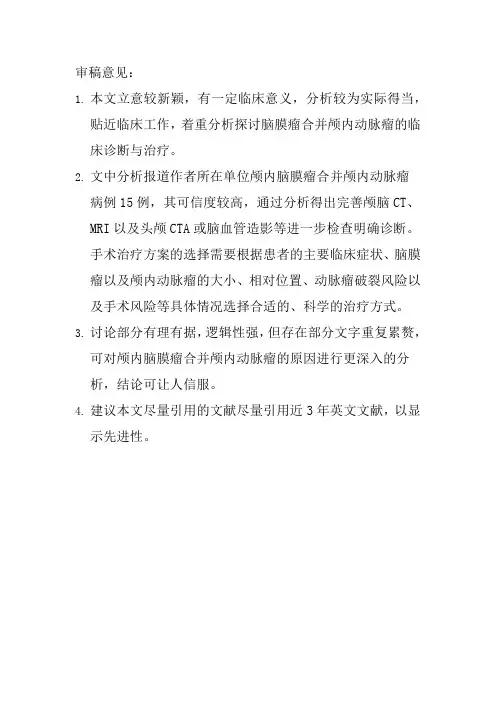
审稿意见:
1.本文立意较新颖,有一定临床意义,分析较为实际得当,
贴近临床工作,着重分析探讨脑膜瘤合并颅内动脉瘤的临床诊断与治疗。
2.文中分析报道作者所在单位颅内脑膜瘤合并颅内动脉瘤
病例15例,其可信度较高,通过分析得出完善颅脑CT、MRI以及头颅CTA或脑血管造影等进一步检查明确诊断。
手术治疗方案的选择需要根据患者的主要临床症状、脑膜瘤以及颅内动脉瘤的大小、相对位置、动脉瘤破裂风险以及手术风险等具体情况选择合适的、科学的治疗方式。
3.讨论部分有理有据,逻辑性强,但存在部分文字重复累赘,
可对颅内脑膜瘤合并颅内动脉瘤的原因进行更深入的分析,结论可让人信服。
4.建议本文尽量引用的文献尽量引用近3年英文文献,以显
示先进性。
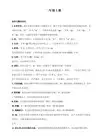
1、凡是在读研究生、第一作者非通讯作者、同等学力在读人员等,发表论文前需经专科主任、导师或通讯作
者共同审稿签字后,经科教科盖章,方可寄出;
2、护理人员投稿,需经专科主任、专科护士长共同审稿签字,护理部登记后,由科教科盖章,方可寄出;
3、审稿时需将论文全文、审查意见表一并交予审稿人审阅;
4、本审查意见表一式两份,第一联交科教科、第二联投稿人留存,论文版面费报销时需将论文原件、复印件
及审查意见表第二联一并提交科教科;
5、未经审稿,将文章投寄(或电子版寄出)发表的,单位一律不予报销版面费和奖励,所发表论文不作为晋
升职称等的依据,如因此出现问题将追究当事人的责任。
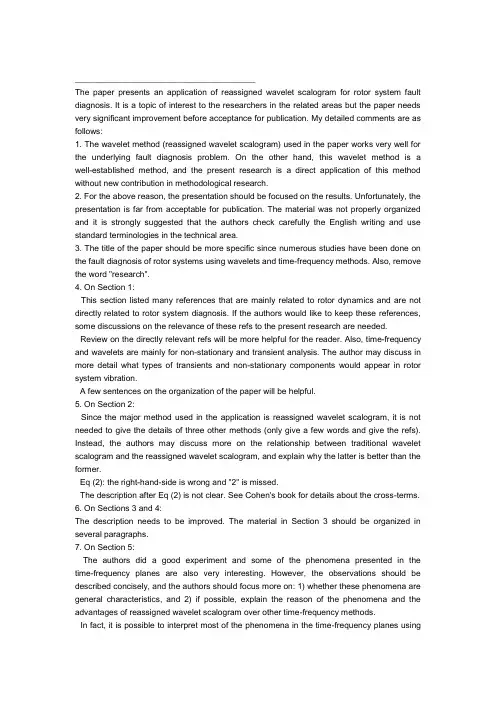
_______________________________________The paper presents an application of reassigned wavelet scalogram for rotor system fault diagnosis. It is a topic of interest to the researchers in the related areas but the paper needs very significant improvement before acceptance for publication. My detailed comments are as follows:1. The wavelet method (reassigned wavelet scalogram) used in the paper works very well for the underlying fault diagnosis problem. On the other hand, this wavelet method is a well-established method, and the present research is a direct application of this method without new contribution in methodological research.2. For the above reason, the presentation should be focused on the results. Unfortunately, the presentation is far from acceptable for publication. The material was not properly organized and it is strongly suggested that the authors check carefully the English writing and use standard terminologies in the technical area.3. The title of the paper should be more specific since numerous studies have been done on the fault diagnosis of rotor systems using wavelets and time-frequency methods. Also, remove the word "research".4. On Section 1:· This section listed many references that are mainly related to rotor dynamics and are not directly related to rotor system diagnosis. If the authors would like to keep these references, some discussions on the relevance of these refs to the present research are needed.· Review on the directly relevant refs will be more helpful for the reader. Also, time-frequency and wavelets are mainly for non-stationary and transient analysis. The author may discuss in more detail what types of transients and non-stationary components would appear in rotor system vibration.· A few sentences on the organization of the paper will be helpful.5. On Section 2:· Since the major method used in the application is reassigned wavelet scalogram, it is not needed to give the details of three other methods (only give a few words and give the refs). Instead, the authors may discuss more on the relationship between traditional wavelet scalogram and the reassigned wavelet scalogram, and explain why the latter is better than the former.· Eq (2): the right-hand-side is wrong and "2" is missed.· The description after Eq (2) is not clear. See Cohen's book for details about the cross-terms.6. On Sections 3 and 4:The description needs to be improved. The material in Section 3 should be organized in several paragraphs.7. On Section 5:·The authors did a good experiment and some of the phenomena presented in the time-frequency planes are also very interesting. However, the observations should be described concisely, and the authors should focus more on: 1) whether these phenomena are general characteristics, and 2) if possible, explain the reason of the phenomena and the advantages of reassigned wavelet scalogram over other time-frequency methods.· In fact, it is possible to interpret most of the phenomena in the time-frequency planes usingrotor dynamics. For example, shaft rub causes broadband vibration and will result in nearly horizontal lines in the phase planes.· Some of the paragraphs are too long.8. The conclusion should be concise and only summarize the most important contribution of the research.Reviewer #2: This paper presents the results of time-frequency analysis applied to a table top rotating machinery test rig under a set of fault conditions. The title of the paper is very misleading because no automated methods for either fault detection or diagnosis/isolation are discussed in the paper. Rather, under different fault scenarios, several time-frequency methods available in the literature are evaluated for their ability to generate visually discriminating features associated with the fault conditions. Hence, this paper provides a characterization of time-frequency features associated with rotating machinery faults as opposed to the development of any type of fault diagnosis methodology. Hence, the paper must be judged solely on the quality of the experimentation, the presentation of the results, and how the time-frequency features identified in the various fault cases relates to the dynamical operating conditions of the rig.The main problem with the paper is that it is very poorly written, and this makes the evaluation and interpretation of the main contributions of the paper obscure. The paper requires a complete rewrite to improve the grammar, style and readability. Also consider:In equation (1) on page 2, what does it mean that h(t) is centered at t=0 and f=0? h(t) is a windowing function in the time domain!What is the point of the simulation experiments, what do they add to what is already known about the time-frequency techniques from the literature?Since the only contribution of the paper is the time-frequency analysis, the results of these computations need to be explained in detail in the text and the graphical results need to be properly annotated so that readers can comprehend and understand which distinguishing features are associated with the faults. Currently, the graphical results are poorly displayed and it is difficult to correlate the figures with the text.以下是从一个朋友转载来的,关于英文投稿过程中编辑给出的意见。
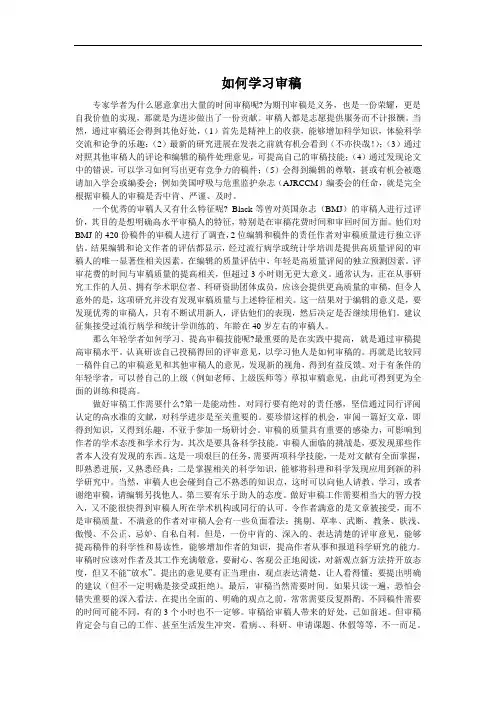
如何学习审稿专家学者为什么愿意拿出大量的时间审稿呢?为期刊审稿是义务,也是一份荣耀,更是自我价值的实现,那就是为进步做出了一份贡献。
审稿人都是志愿提供服务而不计报酬。
当然,通过审稿还会得到其他好处,(1)首先是精神上的收获,能够增加科学知识,体验科学交流和论争的乐趣;(2)最新的研究进展在发表之前就有机会看到(不亦快哉!);(3)通过对照其他审稿人的评论和编辑的稿件处理意见,可提高自己的审稿技能;(4)通过发现论文中的错误,可以学习如何写出更有竞争力的稿件;(5)会得到编辑的尊敬,甚或有机会被邀请加入学会或编委会;例如美国呼吸与危重监护杂志(AJRCCM)编委会的任命,就是完全根据审稿人的审稿是否中肯、严谨、及时。
一个优秀的审稿人又有什么特征呢? Black等曾对英国杂志(BMJ)的审稿人进行过评价,其目的是想明确高水平审稿人的特征,特别是在审稿花费时间和审回时间方面。
他们对BMJ的420份稿件的审稿人进行了调查,2位编辑和稿件的责任作者对审稿质量进行独立评估。
结果编辑和论文作者的评估都显示,经过流行病学或统计学培训是提供高质量评阅的审稿人的唯一显著性相关因素。
在编辑的质量评估中,年轻是高质量评阅的独立预测因素。
评审花费的时间与审稿质量的提高相关,但超过3小时则无更大意义。
通常认为,正在从事研究工作的人员、拥有学术职位者、科研资助团体成员,应该会提供更高质量的审稿,但令人意外的是,这项研究并没有发现审稿质量与上述特征相关。
这一结果对于编辑的意义是,要发现优秀的审稿人,只有不断试用新人,评估他们的表现,然后决定是否继续用他们。
建议征集接受过流行病学和统计学训练的、年龄在40岁左右的审稿人。
那么年轻学者如何学习、提高审稿技能呢?最重要的是在实践中提高,就是通过审稿提高审稿水平。
认真研读自己投稿得回的评审意见,以学习他人是如何审稿的。
再就是比较同一稿件自己的审稿意见和其他审稿人的意见,发现新的视角,得到有益反馈。
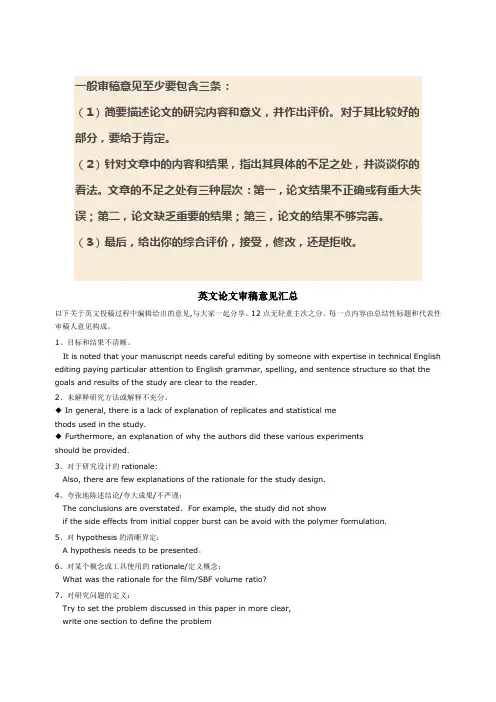
一般审稿意见至少要包含三条:(1)简要描述论文的研究内容和意义,并作出评价。
对于其比较好的部分,要给于肯定。
(2)针对文章中的内容和结果,指出其具体的不足之处,并谈谈你的看法。
文章的不足之处有三种层次:第一,论文结果不正确或有重大失误;第二,论文缺乏重要的结果;第三,论文的结果不够完善。
(3)最后,给出你的综合评价,接受,修改,还是拒收。
英文论文审稿意见汇总以下关于英文投稿过程中编辑给出的意见,与大家一起分享。
12点无轻重主次之分。
每一点内容由总结性标题和代表性审稿人意见构成。
1、目标和结果不清晰。
It is noted that your manuscript needs careful editing by someone with expertise in technical English editing paying particular attention to English grammar, spelling, and sentence structure so that the goals and results of the study are clear to the reader.2、未解释研究方法或解释不充分。
◆ In general, there is a lack of explanation of replicates and statistical methods used in the study.◆ Furthermore, an explanation of why the authors did these various experimentsshould be provided.3、对于研究设计的rationale:Also, there are few explanations of the rationale for the study design.4、夸张地陈述结论/夸大成果/不严谨:The conclusions are overstated. For example, the study did not showif the side effects from initial copper burst can be avoid with the polymer formulation.5、对hypothesis的清晰界定:A hypothesis needs to be presented。
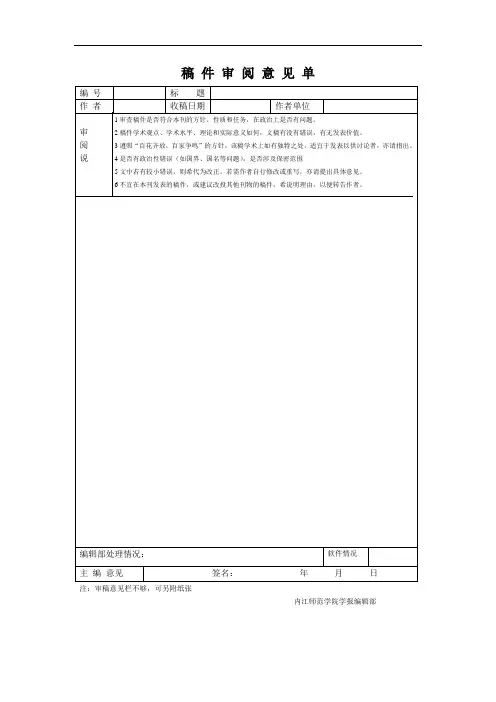

论文审稿Ms. Ref. No.: JSV-D-06-01203Title: Fault diagnosis research based on time-frequency analysis method in rotor systems Journal of Sound and VibrationDear student ××××,We have now received comments on your manuscript from the reviewers (reports included below). Please revise your manuscript according to the referee's suggestions and detail all the changes which you have made. I hope you will be prepared to undertake this, and I will then be pleased to reconsider the manuscript for publication. Please note that due to the extensive revisions necessay on your manuscript, it will need to be sent out for re-review.If you do decide to revise the paper, we need to receive your new manuscript within the next six months. You are asked to submit the following items along with the manuscript:(1) A point-by-point reply that we can send to each reviewer;(2) A separate list of the revisions made to the manuscript.It is important that you address all the issues raised by the referees, either by revision or reasoned rebuttal, before we make a decision on publication.When submitting your revised manuscript, please ensure that you upload the source files (e.g. Word). Uploading only a PDF file at this stage will create delays should your manuscript be finally accepted for publication. If your revised submission does not include the source files, we will contact you to request them.To submit a revision, please go to /jsv/ and login as an Author.Your username is: ********Your password is: **************On your Main Menu page is a folder entitled "Submissions Needing Revision". You will find your submission record there.Yours sincerely,Richard BerrymanEditorial Office (Australasia)Journal of Sound and VibrationReviewers' comments:Reviewer #1: Comments on JSV-D-06-01203Title: Fault diagnosis research based on time-frequency method in rotor systemsBy: ××, ××and ××××××_______________________________________The paper presents an application of reassigned wavelet scalogram for rotor system fault diagnosis. It is a topic of interest to the researchers in the related areas but the paper needs very significant improvement before acceptance for publication. My detailed comments are as follows:1. The wavelet method (reassigned wavelet scalogram) used in the paper works very well for the underlying fault diagnosis problem. On the other hand, this wavelet method is awell-established method, and the present research is a direct application of this method without new contribution in methodological research.2. For the above reason, the presentation should be focused on the results. Unfortunately, the presentation is far from acceptable for publication. The material was not properly organized and it is strongly suggested that the authors check carefully the English writing and usestandard terminologies in the technical area.3. The title of the paper should be more specific since numerous studies have been done on the fault diagnosis of rotor systems using wavelets and time-frequency methods. Also, remove the word "research".4. On Section 1:· This section listed many references that are mainly related to rotor dynamics and are not directly related to rotor system diagnosis. If the authors would like to keep these references, some discussions on the relevance of these refs to the present research are needed.· Review on the directly relevant refs will be more helpful for the reader. Also, time-frequency and wavelets are mainly for non-stationary and transient analysis. The author may discuss in more detail what types of transients and non-stationary components would appear in rotor system vibration.· A few sentences on the organization of the paper will be helpful.5. On Section 2:· Since the major method used in the application is reassigned wavelet scalogram, it is not needed to give the details of three other methods (only give a few words and give the refs). Instead, the authors may discuss more on the relationship between traditional wavelet scalogram and the reassigned wavelet scalogram, and explain why the latter is better than the former.· Eq (2): the right-hand-side is wrong and "2" is missed.· The description after Eq (2) is not clear. See Cohen's book for details about the cross-terms.6. On Sections 3 and 4:The description needs to be improved. The material in Section 3 should be organized in several paragraphs.7. On Section 5:· The authors did a good experiment and some of the phenomena presented in thetime-frequency planes are also very interesting. However, the observations should be described concisely, and the authors should focus more on: 1) whether these phenomena are general characteristics, and 2) if possible, explain the reason of the phenomena and the advantages of reassigned wavelet scalogram over other time-frequency methods.· In fact, it is possible to interpret most of the phenomena in the time-frequency planes using rotor dynamics. For example, shaft rub causes broadband vibration and will result in nearly horizontal lines in the phase planes.· Some of the paragraphs are too long.8. The conclusion should be concise and only summarize the most important contribution of the research.Reviewer #2: This paper presents the results of time-frequency analysis applied to a table top rotating machinery test rig under a set of fault conditions. The title of the paper is very misleading because no automated methods for either fault detection or diagnosis/isolation are discussed in the paper. Rather, under different fault scenarios, several time-frequency methods available in the literature are evaluated for their ability to generate visually discriminating features associated with the fault conditions. Hence, this paper provides acharacterization of time-frequency features associated with rotating machinery faults as opposed to the development of any type of fault diagnosis methodology. Hence, the paper must be judged solely on the quality of the experimentation, the presentation of the results, and how the time-frequency features identified in the various fault cases relates to the dynamical operating conditions of the rig.The main problem with the paper is that it is very poorly written, and this makes the evaluation and interpretation of the main contributions of the paper obscure. The paper requires a complete rewrite to improve the grammar, style and readability. Also consider:In equation (1) on page 2, what does it mean that h(t) is centered at t=0 and f=0? h(t) is a windowing function in the time domain!What is the point of the simulation experiments, what do they add to what is already known about the time-frequency techniques from the literature?Since the only contribution of the paper is the time-frequency analysis, the results of these computations need to be explained in detail in the text and the graphical results need to be properly annotated so that readers can comprehend and understand which distinguishing features are associated with the faults. Currently, the graphical results are poorly displayed and it is difficult to correlate the figures with the text.以下是从一个朋友转载来的,关于英文投稿过程中编辑给出的意见。
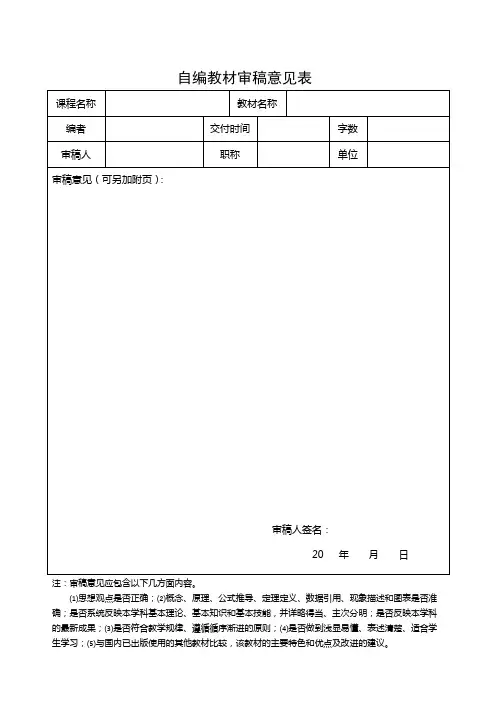
审稿意见模板大全,最新,最全XXX。
While this topic is of interest to researchers in related fields。
XXX:1.XXX method used in the article is effective for XXX。
this method is already well-established and the article does not XXX.2.Given the lack of new methodology。
the article should XXX。
XXX their English writing and use standard technical XXX.The title of the paper needs to be more specific。
as there have been many XXX and time-frequency methods。
nally。
the word "research" should be removed from the title.In n 1.the authors have XXX be included。
XXX to the present research。
It would be more XXX。
wavelets and time-frequency methods are XXX.A brief overview of XXX.Moving on to n 2:XXX method in their n。
thus only XXX for the other three methods。
Instead。
the authors should delve into the comparison XXX。
XXX.XXX (2)。
the right-hand-side contains an error and the value "2" is missing.XXX (2) XXX regarding cross-terms。
审稿意见书尊敬的作者:谢谢您将您的研究论文提交给我们,我们很高兴有机会为您提供审稿意见。
我们认真阅读了您的论文,并提供以下建议和修改意见,以帮助您完善您的论文:1. 研究目的和背景:在引言部分,请明确阐述您的研究目的和研究的背景。
请提供一些背景信息,解释为什么这个研究对于该领域的重要性,并确保逻辑流畅,让读者可以清楚地理解这个研究的动机。
2. 文献综述:请增加文献综述部分,对相关领域的相关研究进行详细的讨论。
说明您的研究如何与现有文献联系起来,并指出前人研究的不足之处。
此外,建议您使用最新的文献,以确保您的研究在目前的学术背景下是前沿的。
3. 研究方法:请在方法部分提供关于您所使用的研究方法的详细描述。
确保清晰地解释您的实验设计、样本选择、数据收集和数据分析方法。
如果有必要,可以添加图表、图形或流程图来更好地呈现您的研究方法。
4. 数据分析和结果:在结果部分,请清楚地展示您的数据分析结果,并使用适当的统计方法进行验证。
请确保结果部分与您的研究问题和目的保持一致,并经过详细分析和解释。
此外,请确保所有图表和图形都清晰可读,并提供详细的标注和说明。
5. 讨论和结论:在讨论部分,请解释并解释您的研究结果,并与现有文献进行比较。
请指出您的研究的局限性,并提出进一步研究的方向。
在结论部分,请对您的研究的主要发现进行总结,并强调其在该领域中的重要性。
请确保您的讨论和结论与您的研究目的保持一致,并提供对该领域的研究和实践的启示。
6. 文章结构和语言:请检查和修改您的文章结构,确保逻辑清晰、条理分明。
请注意一致性和流畅性,尽量避免语法和拼写错误。
请确保您的写作语言简洁明了,让读者能够轻松理解您的观点和论证。
我们希望这些审稿意见能为您提供有价值的帮助,帮助您进一步完善和改进您的论文。
如果您有任何问题或需要进一步的解释,请随时与我们联系。
谢谢您对我们杂志的支持,并祝您在进一步的研究工作中取得成功。
祝好!诚挚地,审稿人。
editorial article审稿意见
我的审稿意见是写一篇题为"[editorial article审稿意见],以中括号内的内容为主题,写一篇1500-2000字文章,一步一步回答"的文章。
以下是对该文章的审稿意见:
1. 引言部分:引言应该引起读者的兴趣并概述文章的主题。
你可以通过提出一个相关的问题、引用一个相关的统计数据或者分享一个相关的故事来引言。
确保引言部分简明扼要,但又能吸引读者继续阅读。
2. 主体段落:根据文章的主题,逐步回答读者的问题或解释相关概念。
在每个主体段落中,提供有力的证据和论据来支持你的观点,并使用适当的引用来支持你的论述。
3. 建议和解决方案:如果可能的话,在文章的结尾提供一些建议和解决方案,以帮助读者解决与主题相关的问题。
确保你的建议和解决方案切实可行,并以简洁明了的方式阐述。
4. 结论部分:结论应总结你在文章中提出的观点和论证,并强调你的观点为什么重要。
确保结论部分简洁明了,并给读者留下一个深思熟虑的印象。
5. 文章结构和逻辑:确保你的文章有一个良好的结构和逻辑,使读者能
够顺利地从一个观点过渡到另一个观点。
使用适当的段落分隔和过渡句子,并且确保每个段落都有一个明确的中心思想。
6. 文字表达和语法:请注意文章中的语法错误、拼写错误和语句结构问题。
使用适当的语言和表达方式,使文章更加流畅和易读。
7. 校对和修订:在完成文章后,请花些时间进行校对和修订。
检查是否有任何不准确或模糊的表述,并确保文章的逻辑和流程都是清晰和连贯的。
希望这些建议对你的文章有所帮助!祝你写作愉快!。
_______________________________________The paper presents an application of reassigned wavelet scalogram for rotor system fault diagnosis. It is a topic of interest to the researchers in the related areas but the paper needs very significant improvement before acceptance for publication. My detailed comments are as follows:1. The wavelet method (reassigned wavelet scalogram) used in the paper works very well for the underlying fault diagnosis problem. On the other hand, this wavelet method is a well-established method, and the present research is a direct application of this method without new contribution in methodological research.2. For the above reason, the presentation should be focused on the results. Unfortunately, the presentation is far from acceptable for publication. The material was not properly organized and it is strongly suggested that the authors check carefully the English writing and use standard terminologies in the technical area.3. The title of the paper should be more specific since numerous studies have been done on the fault diagnosis of rotor systems using wavelets and time-frequency methods. Also, remove the word "research".4. On Section 1:· This section listed many references that are mainly related to rotor dynamics and are not directly related to rotor system diagnosis. If the authors would like to keep these references, some discussions on the relevance of these refs to the present research are needed.· Review on the directly relevant refs will be more helpful for the reader. Also, time-frequency and wavelets are mainly for non-stationary and transient analysis. The author may discuss in more detail what types of transients and non-stationary components would appear in rotor system vibration.· A few sentences on the organization of the paper will be helpful. 5. On Section 2:· Since the major method used in the application is reassigned wavelet scalogram, it is not needed to give the details of three other methods (only give a few words and give the refs). Instead, the authors may discuss more on the relationship between traditionalwavelet scalogram and the reassigned wavelet scalogram, and explain why the latter is better than the former.· Eq (2): the right-hand-side is wrong and "2" is missed.· The description after Eq (2) is not clear. See Cohen's book for details about the cross-terms.6. On Sections 3 and 4:The description needs to be improved. The material in Section 3 should be organized in several paragraphs.7. On Section 5:· The authors did a good experiment and some of the phenomena presented in the time-frequency planes are also very interesting. However, the observations should be described concisely, and the authors should focus more on: 1) whether these phenomena are general characteristics, and 2) if possible, explain the reason of the phenomena and the advantages of reassigned wavelet scalogram over other time-frequency methods.· In fact, it is possible to interpret most of the phenomena in the time-frequency planes using rotor dynamics. For example, shaft rub causes broadband vibration and will result in nearly horizontal lines in the phase planes.· Some of the paragraphs are too long.8. The conclusion should be concise and only summarize the most important contribution of the research.Reviewer #2: This paper presents the results of time-frequency analysis applied to a table top rotating machinery test rig under a set of fault conditions. The title of the paper is very misleading because no automated methods for either fault detection or diagnosis/isolation are discussed in the paper. Rather, under different fault scenarios, several time-frequency methods available in the literature are evaluated for their ability to generate visually discriminating features associated with the fault conditions. Hence, this paper provides a characterization of time-frequency features associated with rotating machinery faults as opposed to the development of any type of fault diagnosis methodology. Hence, the paper must be judged solely on the quality of the experimentation, the presentation of the results, and how thetime-frequency features identified in the various fault cases relates to the dynamical operating conditions of the rig.The main problem with the paper is that it is very poorly written, and this makes the evaluation and interpretation of the main contributions of the paper obscure. The paper requires a complete rewrite to improve the grammar, style and readability. Also consider:In equation (1) on page 2, what does it mean that h(t) is centered att=0 and f=0? h(t) is a windowing function in the time domain!What is the point of the simulation experiments, what do they add to what is already known about the time-frequency techniques from the literature?Since the only contribution of the paper is the time-frequency analysis, the results of these computations need to be explained in detail in the text and the graphical results need to be properly annotated so that readers can comprehend and understand which distinguishing features are associated with the faults. Currently, the graphical results are poorly displayed and it is difficult to correlate the figures with the text.以下是从一个朋友转载来的,关于英文投稿过程中编辑给出的意见。
【最新整理,下载后即可编辑】1、我写审稿意见一般是按下面的步骤来的:首先大体对论文的科学意义和成果水平简单评论一下,一般接收还是返修还是拒稿,这第一段就有了结果。
其实一般来说第一句话就有了初步结果。
然后就是列出几点不足,通常是科学意义和创新性、实验数据(缺少、规律性、数据的必要性等)、结果分析中的问题、写著中的组织结构和表达错误、图片质时、参考文献缺少或太老等。
有时可以把审稿结果放在最后。
2、一般审稿意见至少要包含三条:(1)简要描述论文的研究内容和意义,并作出评价。
对于其比较好的部分,要给于肯定。
(2)针对文章中的内容和结果,指出其具体的不足之处,并谈谈你的看法。
文章的不足之处有三种层次:第一,论文结果不正确或有重大失误;第二,论文缺乏重要的结果;第三,论文的结果不够完善。
(3)最后,给出你的综合评价,接受,修改,还是拒收3、英文论文审稿意见汇总以下关于英文投稿过程中编辑给出的意见,与大家一起分享。
12点无轻重主次之分。
每一点内容由总结性标题和代表性审稿人意见构成。
1、目标和结果不清晰。
It is noted that your manuscript needs careful editing by someone with expertise in technical English editing paying particular attention to English grammar, spelling, and sentence structure so that the goals and results of the study are clear to the reader.2、未解释研究方法或解释不充分。
◆In general, there is a lack of explanation of replicates and statistical methods used in the study.◆Furthermore, an explanation of why the authors did these various experimentsshould be provided.3、对于研究设计的rationale:Also, there are few explanations of the rationale for the study design.4、夸张地陈述结论/夸大成果/不严谨:The conclusions are overstated. For example, the study did not show if the side effects from initial copper burst can be avoid with the polymer formulation.5、对hypothesis的清晰界定:A hypothesis needs to be presented。